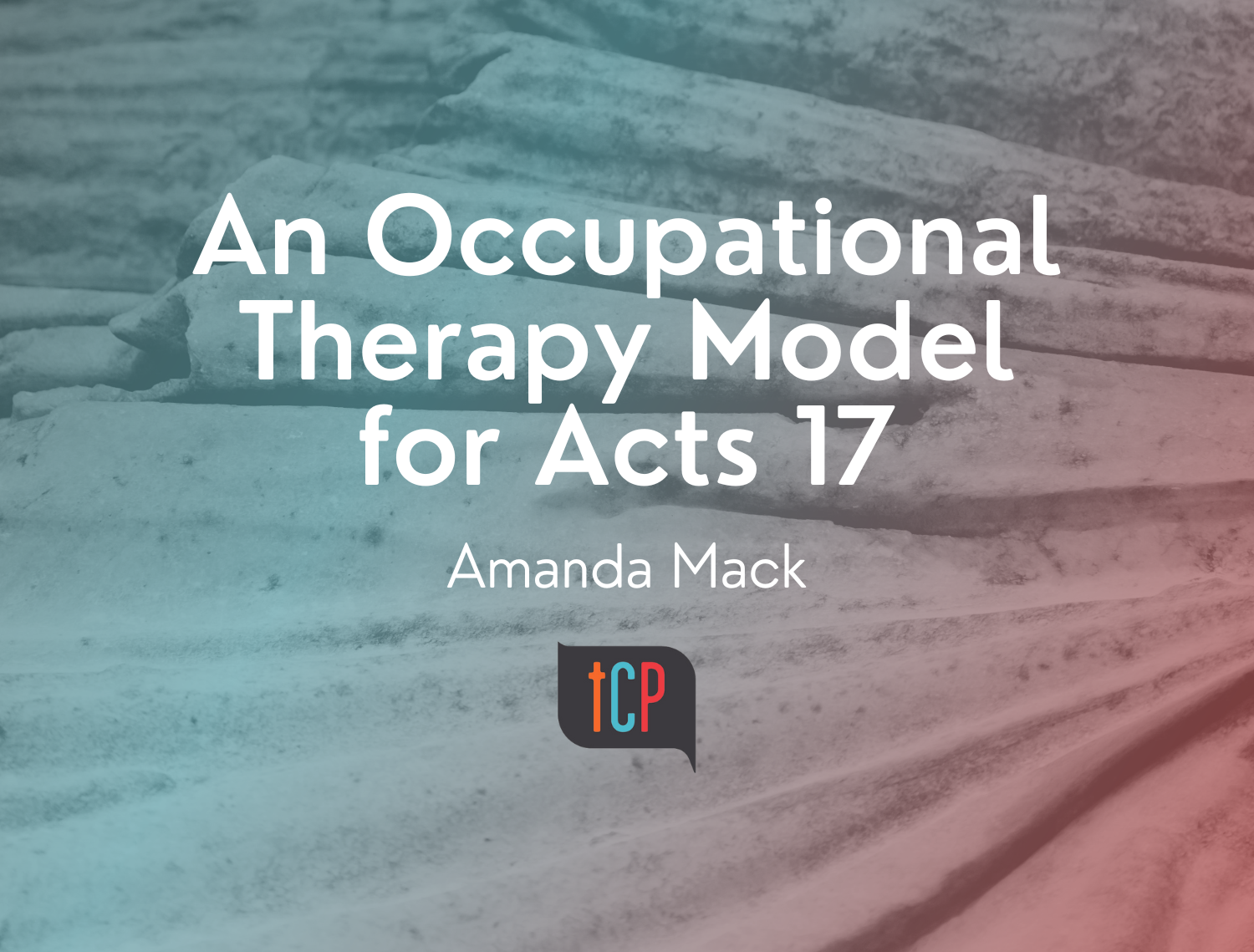An Occupational Therapy Model for Acts 17
By Amanda Mack
Discussions about the role and importance of faith and spirituality often arise in higher education and healthcare. Occupational therapy practice and education, my fields, see these conversations even more so than most. As a profession, we view spirituality as essential to each person. The Occupational Therapy Practice Framework (2020) states that "Values, beliefs, and spirituality influence clients’ motivation to engage in occupations and give their life or existence meaning." Simply defined, occupations are meaningful activities. People construct meaningful lives through participation in occupations and occupational therapists seek to optimize each person’s participation in those occupations. Therefore, as part of occupational therapy practice, it is essential to consider the spirituality of each client.
Outside of occupational therapy, these concepts remain true. Every single person is driven in their occupational participation by their values, beliefs, and spirituality. For all Christians, the importance of recognizing and addressing the spirituality of those we interact with cannot be overstated. What then, do we do, when the spirituality and beliefs of those we encounter differ radically from ours? How do we share the hope of the gospel when we seek to value the lived experience of the person before us?
When I provide occupational therapy, I focus on the person’s needs through profession-specific models. In a different context (not necessarily while treating a client) and for different ends, the practices and models of OT can help Christians think about how we share the gospel and what to look for when we do. One model, the Person-Environment-Occupation-Participation model (PEOP), is widely used and recognized within my field. But it also offers surprising insights into Acts 17. Together, the model and the passage can help guide Christians as we seek to help people participate in the most meaningful occupation—that of loving and worshiping the Lord.
When we examine Acts 17 with the PEOP model, we discover a lens through which Paul looks at the people of Athens. He seeks to emphasize their individual characteristics, the aspects of their environment, and their routines and rituals that may support full participation in their spirituality. He also focuses on those aspects that may hinder their full participation and seeks to provide them with what they need to participate in true worship. Below, you can see the text examined through the framework of PEOP:
Person Factors: Paul engaged with the people of Athens, fully recognizing them as intelligent people who are curious and reasonable. He called out their clear knowledge of the presence of a higher power as well as their firm belief that gods are made to be known and worshiped (v. 22-23). Paul sought to build upon these strengths, reasoning with them and placing the Lord in the context of a god who is to both be known and worshiped. He recognized that their lack of knowledge about "the unknown god" is indeed a major barrier to participation in true worship – how are they to worship the true God if they do not know who He is through Christ?
Environment: Paul saw Athens as a hub of education, where people have access to great thinkers, debates, and cultures. It was a diverse city with people of many religions and beliefs living within proximity to each other – the city had both Jewish synagogues and many idols (v. 16-17). New ideas and insights were valued and sought out (v. 21). Paul quickly recognized that this context was ripe for discussion about Jesus. He understood that this environment, perhaps more than any other, supported open discourse and conversation about both Christ and the implications of His death and resurrection for all people. In this environment of seeking and religious plurality, Paul could openly declare the truth of the gospel in a way that was not acceptable in other environments (i.e. Jerusalem).
Occupation: Even in its dysfunctional form, Paul could see that the people of Athens were committed to the occupation of worship. Paul could see the evidence of their commitment: “the city was full of idols” (v. 16). He also understood that belief in a higher power could not be separated from the occupation of worship. He calls out the difference between serving idols made of gold and silver and the acts of repenting of sin and following the one true God. Through his words, he tried to show the Athenians that while they may be engaging in worship, true worship must be directed toward Christ.
Participation: Only after Paul understood the people, their occupations, and the environment did he begin to speak. Through that knowledge and observation, he skillfully delivered knowledge of the gospel. Paul expertly identified how he can put to use the strengths of the people of Athens, including their intellect and reason, their fervor for worship, and even their spiritual environment, to effectively make the gospel known to them. He also did not shy away from the thing he knows will help them fully participate in true worship—that is, knowledge of the gospel—but tailored the delivery to their specific characteristics and environment.
Paul's interaction with the Athenians provides us with a framework for when we too share the good news of Christ. We must not share the gospel out of context, or ignore the lived experiences or strengths of those who do not yet know Christ. Instead, we must embrace the culture, experiences, and values of those with whom we have the true joy of sharing the gospel. We can fully embrace who they are and where they come from, while also letting the truth of the gospel of Christ speak to them and bring them to the true knowledge, faith, and worship of the Lord (Rom 10:17).
Amanda Mack is Assistant Professor of Occupational Therapy and Medicine as well as Director of Post-Professional Education at Washington University School of Medicine in St. Louis.

